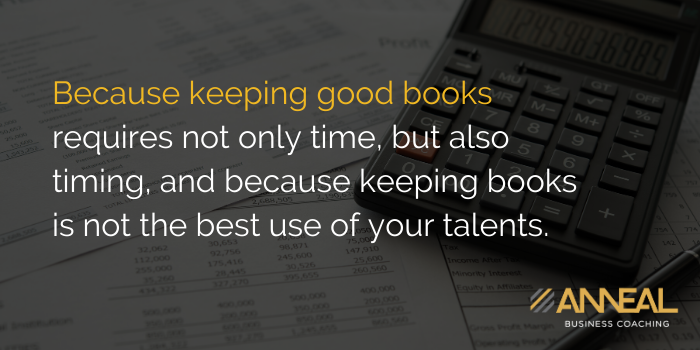Why You Should Not Keep Books in Your Business
Good books are the foundation of business management. Good information from good books enables us to make better decisions and more money with less stress.
At their most basic level, good books answer five questions:
Am I making money?
What do I own?
What do I owe?
What’s left over for me after I pay everyone else?
Where did all of my cash go?
Why You Should Not Keep Books - 1
Every business owner or manager should know the answers to those five questions — without guessing.*** The answers provide information we need to manage that most precious business resource: cash. They help us manage relationships with the IRS, our partners, our bankers, our employees, and with our customers and suppliers. They give us a score that tells us how well we have managed our businesses up to now. That’s a lot of useful information, but good books also answers a sixth, even more useful question:
6. What should I do?
When we know how to use them, good books inform an astonishing number of decisions about the future. They help identify specific problems, suggest solutions, and provide a way to measure improvements. Answering question six is the highest and best use of bookkeeping.
Why YOU should not keep books
Even in a short article, we have seen enough to know that our businesses cannot thrive without good books, which explains why YOU should not keep books in your business. Why not you? Because you are not likely to be very good at it. Because keeping good books requires not only time, but also timing, and because keeping books is not the best use of your talents.
Why You Should Not Keep Books - 2
First — Keeping good books requires detailed understanding of two subjects: bookkeeping and bookkeeping software. Those are not the same thing. There is much to know about bookkeeping, and much to know about bookkeeping software. The combination is a lot to learn and a lot to keep up with — especially if we do not have a good understanding of bookkeeping and do not make bookkeeping entries every day.
Second — Bookkeeping is about making accurate records of transactions, but accuracy is not enough. We also have to make timely records. A few days behind becomes a few weeks behind, which becomes a few months behind, by which time we no longer have good books or useful information. As owners and managers, it’s very hard to deal with the day to day concerns of running a business while simultaneously devoting the necessary time and attention to our books.
Third — Even if we had the time, skill, and inclination to keep good books, bookkeeping is not the best use of our talents. We can hire specialists to keep our books, and accountants to review them. By doing so, we are free to work on our businesses to increase sales, improve productivity, open new markets, and to implement all the actions suggested by our newfound appreciation for bookkeeping information.
Our role as business owners and managers is to recognize good books, to insist on them in our business, and to make good use of the information they provide. It is a mistake for us to also keep books. We should hire a qualified bookkeeper, bookkeeping service or accountant to keep books for us.
***Can you answer all five questions for your business? Do you really know, or are you guessing? How would your life be different if you had accurate, current answers to all five? How would your life be different if you knew how to use bookkeeping information to make better decisions and more money?
My new book “They Say I Make Money, So Why Don’t I Have Any?” will be out in February. It will NOT teach you how to keep books. It will show you how to recognize good books and how to use the information they provide to make better decisions and more money.
If you would like to be notified when the book is available for purchase, please enter your email in the form below.


